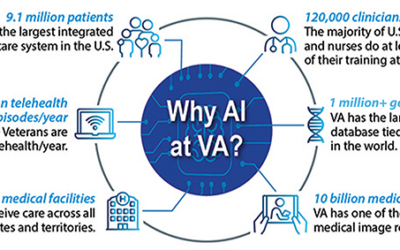The younger age of chronic kidney disease (CKD) in Black patients can help explain some of the differences and disparities compared to white patients with CKD, according to a new study.
Much More Dual Testing for CKD Needed Within VHA
A new study that included VA researchers made the case for much more dual testing for chronic kidney disease (CKD) in high-risk patients to improve disease management and patient outcomes.
Processing of ICE Medical Claims by VA Sparks Controversy in Congress
Republican legislators butted heads with VA officials last month over the question of whether department resources were being spent on immigrants who have been placed in the custody of Immigration and Customs Enforcement (ICE).
Issues With Pharmacy Module in VA EHR Could Cause Medication Errors
Ongoing problems with the pharmacy module in VA’s new Oracle electronic health record (EHR) have the potential to lead to medication errors, increasing lawmakers’ concern about plans to expand the new system.
VA Has Low Rates of Preoperative Life-Sustaining Treatment Documentation
Surgery is a significant healthcare event that necessitates timely planning for goals of care (GOC), involving discussions about one’s current values, aspirations and treatment preferences.
Mortality Rises in VHA Inpatients With COVID-19 Plus HAI Infections
Pseudomonas aeruginosa (PA), an opportunistic pathogen commonly associated with healthcare-associated infections, has a high mortality rate. The organism’s high virulence and ability to rapidly acquire resistance to antibiotics make PA infections a treatment challenge.
New Study Defines Clinically Important Measures of Diabetes Distress
The term “diabetes distress” is used to describe the emotional response to living with diabetes, a life-threatening illness that requires chronic and demanding self-management.
VA Healthcare Found to Generally Be More Efficient Than Private Care
Several recent studies have shown that VA healthcare is consistently as good as—or better than—non-VA healthcare. Now a study shows VA healthcare is also more efficient.
Vet Centers Don’t Always Appropriately Document, Address Veteran Suicide Risk
VA’s Vet Centers are repeatedly falling short when it comes to properly assessing and documenting veterans’ suicide risk, according to department watchdogs.
Some Veterans With Dementia Might Have Treatable Cirrhosis Brain Effects
Could 1 in 10 veterans diagnosed with dementia actually have reversible cognitive decline caused by advanced liver disease?
Bramhall Works to Resolve Common Hearing Loss in Military Veterans
It’s such a common ailment among veterans that it’s almost a given: If you served any time in the military, you’re walking out with some type of hearing problem. That usually presents as hearing loss or tinnitus—a persistent ringing sound in the ears.
Smaller Brainstem Volumes Found in Gulf War, Iraq/Afghanistan Veterans
Gulf War and Iraq/Afghanistan veterans have significantly smaller brainstem volumes compared to healthy civilians, and damage to the brainstem structure of these veterans could potentially lead to sleep disturbances and chronic pain, according to a recent study.
New Research Suggests Use of Benzodiazepine Alternatives for COPD Insomnia
The safety and long-term effects of hypnotic medications in chronic obstructive pulmonary disease (COPD) have been called into question by a new study.
Cold, Heat Waves Can Present Extra Danger for COPD Patients
Patients with chronic obstructive pulmonary disease (COPD) are adversely impacted by extreme weather conditions, and the effects vary by gender and ethnic backgrounds.
Legislators Told AI Both Promising, Scary for Improving VA Healthcare
The speed at which artificial intelligence (AI) is being embraced at the VA has legislators both hopeful and concerned, optimistic that it can improve veterans’ health but worried about data privacy and the possibility of software superseding human decision-making in clinical settings.
Misinformation or distrust of vaccines can be like a contagion that can spread as fast as measles
Theresa Tam serves as Canada’s Chief Public Health Officer. Like many public health officials during the COVID-19 pandemic, Dr. Tam was the focus of considerable criticism of her recommendations as the virus spread. Health officials worldwide tried to guide the public on responding to the virus based on few facts. At the time, the virus was new and barely understood. There was no vaccination and little science regarding the COVID-19 virus. Fortunately for all of us, much has improved regarding our understanding and treatment of COVID and other respiratory viruses.
New Guidelines Make Targeted Therapy Recommendations for CRC
The American Society of Clinical Oncology (ASCO) recently developed recommendations for the treatment of patients with metastatic colorectal cancer (mCRC).
More Research Needed on MMPs, Especially in CRC Patients With IBD
An important research focus in colorectal cancer concerns the enzymes comprising the 24-member matrix metalloproteinase (MMP) family of zinc- and calcium-dependent endopeptidases.
Understanding of KRAS Variations and Their Management Is Evolving
Since 2010, KRAS molecular testing has been guideline-recommended in the VA healthcare system. The goal has been to help determine how metastatic cancer is likely to respond to anti-EGFR drug therapy.
VA Pushes to Increase Uptake of Genomic, Other Precision-Testing in CRC
Patients receiving oncology care within a VHA facility are eligible for genomic- and other precision-testing, if they have an advanced-stage tumor or blood cancer and can tolerate recommended therapies.
Epidemiological Changes in CRC Will Have Significant Impact on VHA
The VA treats about 3% of all cases of colorectal cancer (CRC) in the United States each year—6% among cases in men. So, any epidemiological changes have an outsized effect on the nation’s largest integrated healthcare system.
Study: Vietnam War-Era Veterans Not at Increased Risk of Suicide Mortality
Veterans who served in the Vietnam War era, either in theater or not deployed, are not at increased risk of suicide mortality compared with the U.S. population, although the number of suicides among these veterans is noteworthy and merits the attention of mental health professionals and policymakers, according to a recent study.
Groups Funded to Help Prevent Veterans Suicides Overwhelmed by Paperwork
For the past two years, VA has overseen the distribution of grants to community organizations whose work is designed to help prevent veteran suicide.
HIV Preexposure Prophylaxis in MHS Not Linked to Higher STI Risk
Consistent use of HIV preexposure prophylaxis (PrEP) has been shown to reduce the risk of sexual risk of HIV acquisition by 99% among men who have sex with men (MSM).
VA Study: Microbial Contamination Continues in Hospitals, Even When Recommended Cleaning Protocols Are Followed
Microbial contamination—including pathogenic and potentially pathogenic bacteria—persisted on high-touch hospital surfaces despite compliance with recommended disinfection protocols, according to a study performed at the Central Texas Veterans Healthcare System.
Psychological Distress Complicates Remote mTBI
Recovery from mild traumatic brain injury (mTBI) and posttraumatic stress, which are prevalent in military servicemembers, is complicated because the conditions share objective and subjective cognitive symptoms.
Women Veterans With Epilepsy Have More Psychiatric Diagnoses
Women Veterans with epilepsy (WVE) might have unique psychiatric comorbidities that affect presentation, treatment and outcomes.
How Veterans With TBI, GWI Present With Frontotemporal Disorders
Frontotemporal lobe disorders (FTD), which affect personality, behavior and language, are among the most common brain neurodegenerative disorders.
Bright Light Therapy Remains Underused Within VA Healthcare System
Since the 1980s, when seasonal affective disorder was first identified, one of the first-line treatments has been Bright Light Therapy.
Cannabis-Use Disorder Riskier in Veterans With Mental Health Conditions
Veterans with psychiatric disorders, especially those with serious mental health issues, are especially vulnerable to cannabis-use disorder, according to a new study warning of an increase in the condition.




